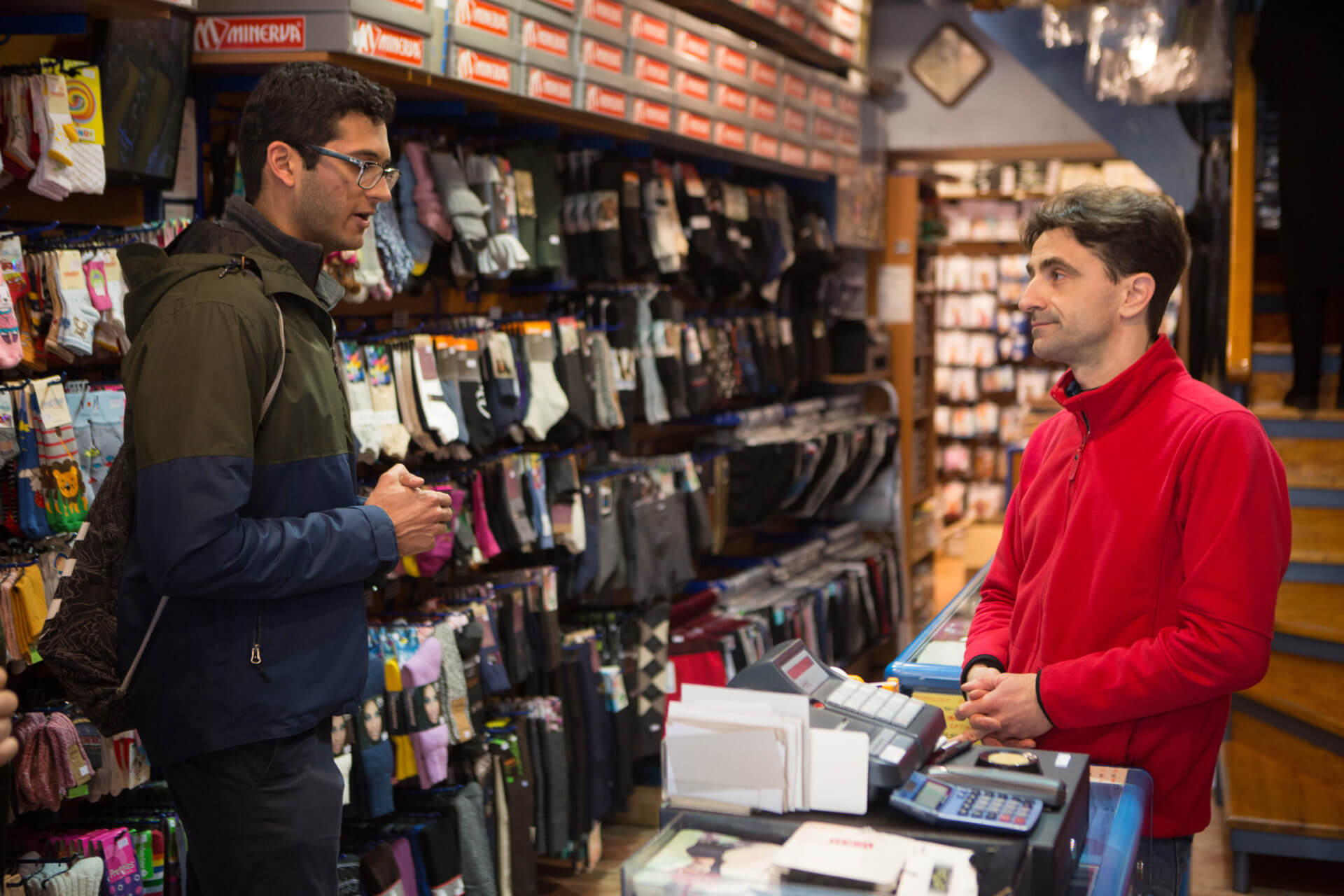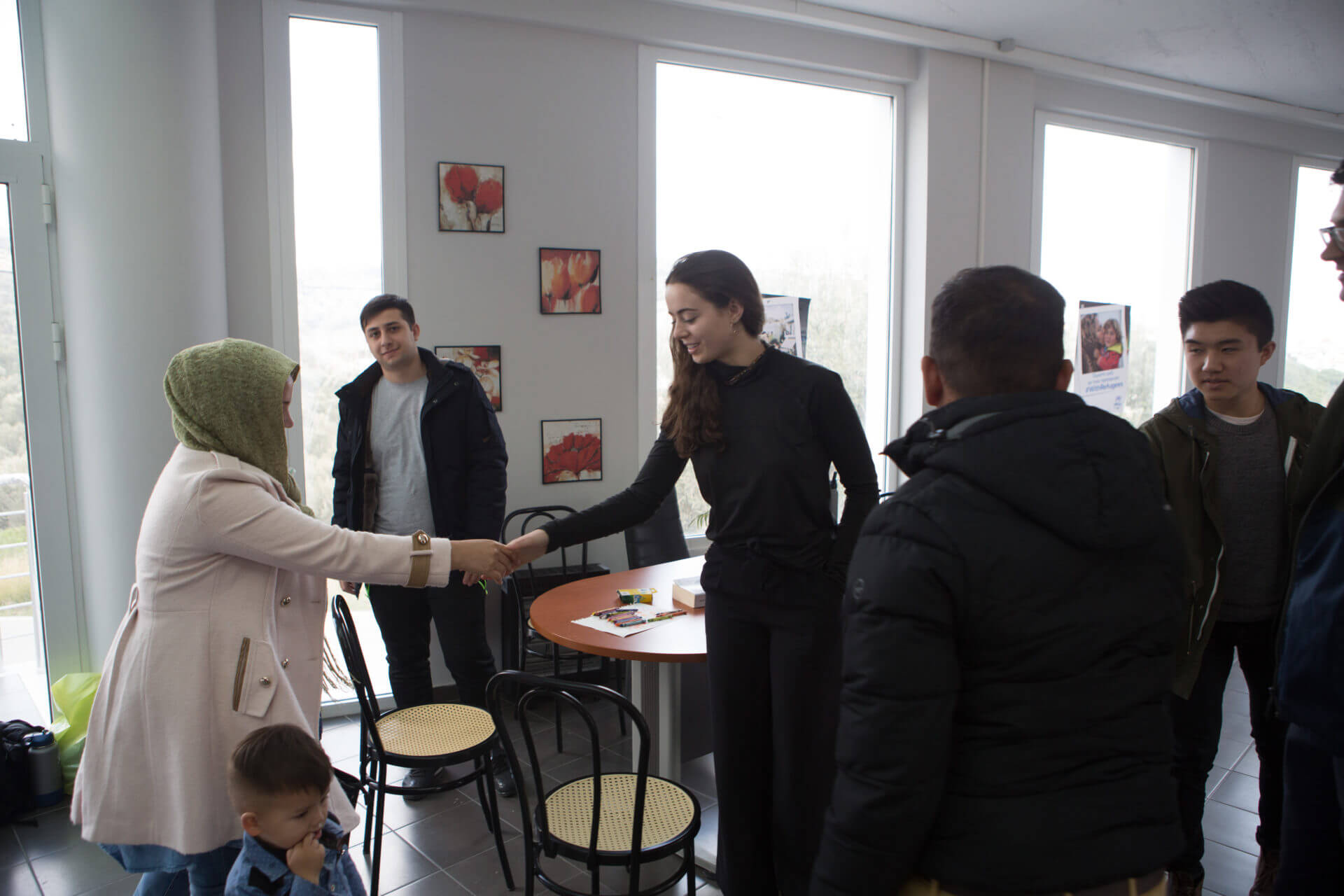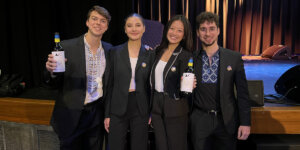
Team Duet (L to R): Spencer Perry, Spence Blood, Michael Cesar, Raghav Maheshwari, Rhys Richmond, Stephanie Van Sickel and Lucas Hu. Photo courtesy of Duet.
One basic item.
One refugee.
One donor.
One struggling local store owner.
Their stories are now coming together through the power of tech and the generosity of the human spirit to build one community.
That is the recipe for Duet, a student-led social entrepreneurship start-up that is changing the way we think about and do philanthropy.
Officially launched in March 2019, out of a new course offered in the USC Viterbi School of Engineering, Duet has reached over $10,000 in donations, and 100 unique donors from across the globe as of this writing. They are now looking to expand to touch the lives of the growing number of displaced people worldwide, which as of June 2019 surpassed 70 million.
Duet built their idea on a simple, yet powerful concept: What if you could match one donor anywhere in the world with one resettled refugee in a host nation through item-specific giving – something that a refugee needs and personally chooses – in a way that reduces donation waste, increases autonomy, builds empathy and uplifts the local economy?
“We all love choices,” said Michael Cesar ’19, business administration, Duet’s co-founder. “But imagine being removed from your home and losing all your earthly possessions, then being dropped into a foreign culture where you have to rely on donations and a small government stipend.”
The students behind Duet witnessed the disempowering experience of becoming a refugee firsthand in September, 2018 when they traveled to the Greek island of Lesvos, host to some 20,000 refugees. They came to the island to conduct user-research inside refugee camps as part of their course requirement.
The novel engineering course, “Innovation in Engineering Design for Global Challenges,” has provided 61 students from 14 different majors and 8 USC schools unprecedented access inside the infamous Camp Moria. The course integrates the lean startup method with rapid prototyping techniques and human-centered design and applies it in a real-world context. Often cited as “one of the worst refugee camps on earth,” Moria has become the initial focus for students to create solutions to help people caught up in the worst humanitarian crisis since World War II.
“What we discovered is a systemic problem. Not only do refugees suffer but so does the local community still recovering from the greatest financial crisis in Greece’s history,” said Rhys Richmond, biomedical engineering junior and Duet’s co-founder.
Richmond researched how aid is distributed and perceived and whether or not it actually lifts people out of poverty. She was dumbfounded by the estimated 800 million euros that poured to aid the humanitarian crisis in Greece compared to the current state of refugees on the island.
“We wrestled with the concepts of philanthropy and the creation of dependencies when we engage in charity. What we aimed to create was something that turns the whole idea on its head,” she said.
Scenes from the upcoming documentary film “Lives, Not Grades”
A beautiful dance
Lesvos, birthplace of ouzo and poets, has been disproportionally impacted by the refugee crisis. Only six miles separate it from Turkey. In 2015, at the height of the crisis, the island saw more than 379,000 refugees land on its shores, ten times the population of its largest city Mytilene, arriving at an average rate of 3,300 per day. That’s more than the entire undergraduate student population of USC Viterbi landing on the island on small inflatable boats every single day for an entire year. People operating tourist-based businesses, the lifeblood of Lesvos, saw a sudden 85% drop in their income. They have yet to recover.
But the islanders’ initial response to the crisis was the stuff of history books. Fishermen abandoned their nets to help rescue people from the sea. Villagers and hotel owners turned hotels and homes into shelters. Restaurants fed newly arrived refugees until they ran out of food. Collectively, the islanders were nominated for a Nobel Peace Prize.
“I’ve never seen anything like it,” said Anastasios Perimenis, managing director of ETAL S.A. Local Development company, who has led business development initiatives in Lesvos for over 18 years and who has been advising Duet on working with local businesses. “It really made me proud to be an islander.”
As Europe began to close its borders to refugees and tens of thousands remained stranded on the island in asylum limbo in overcrowded makeshift camps, the headlines began to read: “Lesvos, Island of Despair,” “Hell on Earth.”
“Today when people think of Lesvos, they immediately think of the refugee crisis,” Perimenis said. “But the island is so much more than that.”
The people of Lesvos, many of whom are the descendants of War World I refugees from Turkey, began to see a situation that had spiraled out of control. Foreign volunteers descended on the island in droves, many with no experience in international humanitarian aid and no cultural sensitivity training.
The idyllic village of Moria which neighbors the camp and is home to an ancient Roman aqueduct, once boasted some 60 storefronts. Today, only seven are open. “Moria no good” is spray-painted on homes that were built by Lesvos’ War World I refugees with stones from a nearby medieval fortress. These stores that once spilled their colorful fruit and pastry stands into the cobbled streets are now reinforced with barbed wire and fenced windows.
It is to this backdrop that Duet began to sprout as an idea.
“Like a beautifully synchronized dance, we see our platform as a duet between refugees and local store owners,” said Richmond who is also a classically trained dancer. “That same duet happens between refugees and far off givers, who may only know about the crisis from the headlines.”
Powered by technology and the generosity of the human spirit

Raghav Maheshwari, Duet’s co-head of engineering meets with a local store owner on Lesvos island Photo / Elias Marcou
Duet now does this in four clicks, but getting there was a mammoth undertaking that went above and beyond what’s typically required of a course.
With the help of UNHCR and other organizations on the island, Duet had to identify refugee families who were willing to share their stories with the world and a small network of family-owned stores willing to sign up on a student-led project across the Atlantic. It required a lot of socially complex trust-building, long nights of coding, deep debates about philanthropy and multiple trips to Greece.
“We worked with these families over the course of a year to provide them the basic building blocks for a new life” said Lucas Hu, a computer science senior and duet’s co-head of engineering with Raghav Maheshwari, also a computer science senior. Duet’s design is led by Spence Blood, a business administration junior at USC Marshall who has twice traveled to Lesvos with Duet to obtain constant feedback from refugees and store owners alike and enhance the platform’s overall experience.
“Like a beautifully synchronized dance, we see our platform as a duet between refugees and local store owners.”
Rhys Richmond
“We have a family with children that is about to start school, but they can’t afford to buy their own school supplies,” Hu said. “Through Duet, this family can now go to one of our partner stores on the island, take a picture of the item they need, and upload that photo directly to our refugee app. This way, refugees can tell us exactly what they need instead of us making assumptions.”
Donors anywhere in the world can then meet Duet families through the giveduet.org website.
“They can read their stories and see the items they’ve requested,” Maheshwari said. “We’re currently working on a data-driven algorithm that can help match donors to items that they may want to donate and to ensure that our families are being surfaced and funded fairly on our website.”
Once Duet receives a donation, it automatically transfers the funds to a local store. Maheshwari and Hu also built a donation tracker that shows the entire journey of a donation. Refugee families confirm that they’ve picked up the items by sending Duet photos. With the family’s permission, these photos can also be shared with the donor. The local store approach also solves the longstanding problem of distribution which is especially challenging on an island.
“When you feel you can afford the needs of your children, it makes you feel better about yourself.”
Moshfequllah Nasiri
“The entire process, from item requests to receiving donations on our website, to facilitating item pick-ups half-way across the world on an island is fully automated,” Maheshwari said. “It means that we can add another 1,000 families unto our platform as easily as we add the next 100.”
Duet’s technology allows the team to operate with very low overhead and stay lean. To remain sustainable and growth-oriented, they’ve introduced an opt-in fee for donors, and have plans to include a manageable percentage fee to stores. Meanwhile, they have begun expanding beyond Greece to other scenarios of human displacement around the world, including the United States.
“The support from USC Viterbi has really allowed Duet to flourish and prosper,” said Cesar who as the company’s C.E.O. is truly living the entrepreneurial life, working on Duet full-time since graduation. “We really wouldn’t be where we are today were it not for the support of this course.”
Lives, not grades
The course, launched in fall 2018 out of the Sonny Astani Department of Civil and Environmental Engineering, integrates design thinking with systems thinking and the lean startup method, teaching students rapid prototyping techniques and human-centered design applied in a real-world context. It’s the first-ever university course given official access to Moria camp. The course has its own manifesto, part of which reads: “Lives, Not Grades,” and “Prototypes not PowerPoints.”
“Duet is a true example of user-centered design and the power of cross-disciplinary collaboration,” said Professor Burcin Becerik-Gerber who co-teaches the class with Brad Cracchiola, ’93, MS ’98, an industry expert in engineering design; David Gerber, associate professor of practice of civil and environmental engineering and architecture; and course coordinator Daniel Druhora, a documentary filmmaker who is producing a feature film about the course titled “Lives, Not Grades” to be released in early 2020.

Duet’s co-founder Rhys Richmond (biomedical engineering) onboards a new refugee family onto the Duet platform. Photo / Elias Marcou
“The team made up of engineering, business, design and journalism majors underwent multiple iterations and field testing before arriving at their current solution underscoring the importance of doing real innovation under real conditions,” said Becerik-Gerber who holds the Stephen Schrank Early Career Chair in Civil and Environmental Engineering.
USC Viterbi sponsored team Duet to travel to Germany and to Lesvos on four separate occasions over the course of one year. It also gave them a prototyping budget to get their platform off the ground. Two separate teams of computer science students helped develop Duet over two semesters as part of their Advanced Capstone Project course taught by Jeffrey Miller, associate professor of computer science.
Since then, Duet’s growth has been propelled by grassroots efforts and word of mouth led by Spencer Petty, a journalism senior at USC Annenberg and Duet’s head of marketing In the team’s recent visit to Greece, refugee families have also shared the impact on their lives with the students.
“Duet helps me take care of the needs of my children.” said Moshfequllah Nasiri, an Afghan refugee who was a FIFA referee before he and his family were displaced. Duet helped Nasiri obtain school supplies for his children. He dreams that they will one day have the opportunity to study and become doctors. “When you feel you can afford the needs of your children, it makes you feel better about yourself,” he said.
“The changes that we’re creating on the island of Lesvos go far deeper than the dollars donated,” said Stephanie Van Sickel, USC Marshall MBA student and Duet’s head of business development. “By creating interactions between our local store owners and Duet families, we’ve started to see a significant emotional shift in both parties, a connection that’s beyond transactions, it’s about viewing each other as neighbors and friends.”
Published on December 9th, 2019
Last updated on April 8th, 2021









